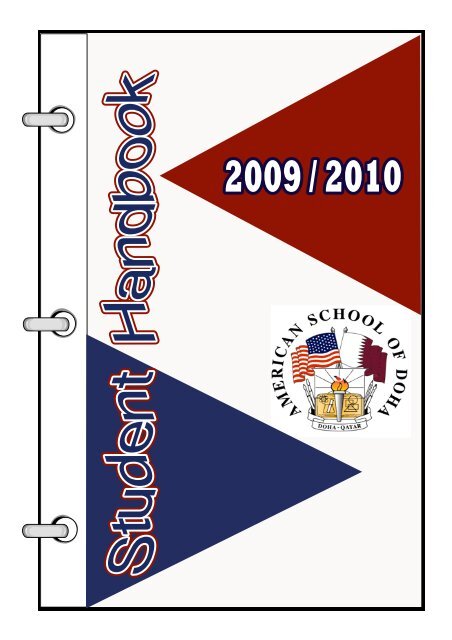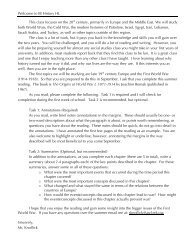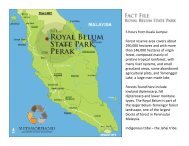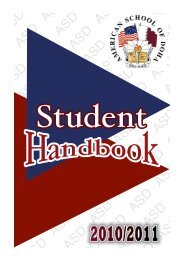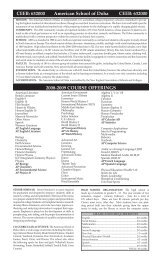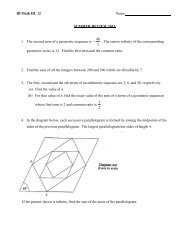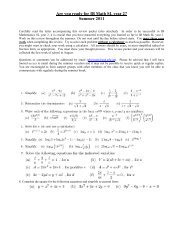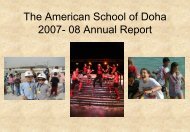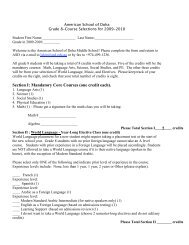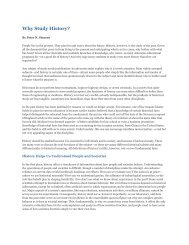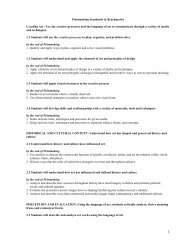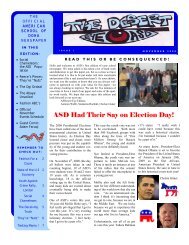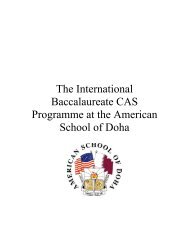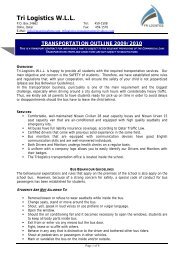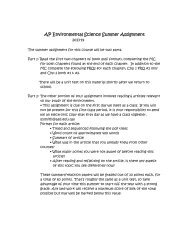Acceptable Use Policy - American School of Doha
Acceptable Use Policy - American School of Doha
Acceptable Use Policy - American School of Doha
You also want an ePaper? Increase the reach of your titles
YUMPU automatically turns print PDFs into web optimized ePapers that Google loves.
ELEMENTARY STUDENT HANDBOOK<br />
Dear Students and Parents,<br />
Welcome to the 2009/2010 school year at The <strong>American</strong> <strong>School</strong> <strong>of</strong> <strong>Doha</strong>. Every year, I write<br />
about how new and different the coming school year will be, but this is only partially true for<br />
this year. The biggest change is that we will be without construction on the elementary<br />
campus for the first time in two years. Like the middle and high school, this is the year that we<br />
will learn how to better use <strong>of</strong> facilities and take advantage <strong>of</strong> all the great opportunities within<br />
our school. The other major change is that all the sand around the school will begin to be<br />
planted and landscaped so that the outside <strong>of</strong> our school looks as nice as the inside <strong>of</strong> our<br />
school. I hope that all <strong>of</strong> you will help us take good care <strong>of</strong> our new school.<br />
As with every new school year, we have lots <strong>of</strong> new students and families joining our<br />
community. Using our school values <strong>of</strong> Respect, Responsibility, Honesty, and Compassion,<br />
we need to make all <strong>of</strong> our new ASD family members feel welcome in their new home.<br />
If you are a new parent or student, my best advice to you is to get involved as quickly as<br />
possible. We have lots <strong>of</strong> great after school activities, baseball, and soccer on weekends, and<br />
a great swim club as well. Once you get to know us, you will love us!<br />
Three things make our school special: great teachers who care about their students, terrific<br />
students who want to learn and play together, and parents who support and help the school<br />
and all ASD children. This is the type <strong>of</strong> collaboration that makes the school a wonderful<br />
place for everyone.<br />
This handbook has been put together to introduce you to the regulations that are our<br />
guidelines at ASD. Please take the time to read these and if there are any questions or<br />
inquiries, please feel free to contact us.<br />
Once again, welcome to ASD, we look forward to another pleasurable and successful school<br />
year all together.<br />
Sincerely,<br />
Edwin V. Ladd<br />
Director-ASD
ELEMENTARY STUDENT HANDBOOK<br />
Dear Elementary Families,<br />
Welcome to the 2009-2010 school year at the <strong>American</strong> <strong>School</strong> <strong>of</strong> <strong>Doha</strong>! On behalf <strong>of</strong> the<br />
faculty and staff <strong>of</strong> the elementary school, we would like to extend our welcome to all <strong>of</strong> you.<br />
Our fundamental purpose at the <strong>American</strong> <strong>School</strong> <strong>of</strong> <strong>Doha</strong> is to develop academic success in<br />
each <strong>of</strong> our students; however, the true secret <strong>of</strong> our school lies in the close relationships that<br />
bind our community together. Here education is an active partnership. Parents and teachers<br />
work together to create an environment, which is based on high expectations and excellence.<br />
Our students achieve because we expect them to and they come to expect it <strong>of</strong> themselves.<br />
Moreover, by their dedication and talent, our students challenge each other to find the best in<br />
themselves. Working in partnership, we can produce a dynamic learning community<br />
committed to student success.<br />
Our program is a balance <strong>of</strong> structure and flexibility, designed to foster confidence and<br />
creativity and to equip students with the skills and self-discipline they will need on their journey<br />
to becoming independent life-long learners. Embedded in the heart <strong>of</strong> our program are our<br />
school values <strong>of</strong> RESPECT, HONESTY, RESPONSIBILITY, and COMPASSION, which apply<br />
to students, faculty and staff, as well as to our parental community.<br />
Each year at ASD, changes are in the air, and we therefore ask that you review the contents<br />
<strong>of</strong> this revised handbook carefully and share it with your child.<br />
We welcome you to an exciting new school year. Thank you for your continuing support <strong>of</strong> our<br />
elementary school program!<br />
Sincerely,<br />
Don LeBlanc Lana Al-Aghbar Scott Barnwell<br />
Elementary Principal Associate Principal Associate Principal
THE AMERICAN SCHOOL OF DOHA<br />
Our Vision<br />
A dynamic learning community recognized as one <strong>of</strong> the leading<br />
international schools in the world through our commitment to student<br />
success.<br />
Our Mission<br />
The <strong>American</strong> <strong>School</strong> <strong>of</strong> <strong>Doha</strong> is an independent, U.S. accredited, college<br />
preparatory school, committed to provide the highest standard <strong>of</strong><br />
educational excellence, through an enriched <strong>American</strong> curriculum. We<br />
draw from, and build upon, the uniqueness <strong>of</strong> our multicultural student<br />
body while preparing students for the challenges <strong>of</strong> a rapidly changing<br />
global society.<br />
The school will accomplish this by providing a positive, safe and<br />
supportive environment, high measurable standards, and a clearly<br />
defined, integrated curriculum implemented by a highly qualified and<br />
motivated staff. In partnership with parents, and in an atmosphere <strong>of</strong><br />
open communication, the school will enable each student to reach his or<br />
her full potential and to develop a lifelong love <strong>of</strong> learning.<br />
Our Values<br />
Respect<br />
Honesty<br />
Responsibility<br />
Compassion
ELEMENTARY STUDENT HANDBOOK<br />
TABLE OF CONTENTS<br />
A Letter from the Director<br />
Welcome from the Elementary <strong>School</strong> Principals<br />
Vision, Mission, and Values <strong>of</strong> ASD<br />
Admission Information, Requirements & Bussing<br />
Admissions Policies and Procedures 1<br />
Age Requirements 1<br />
Registration Fee 2<br />
Tuition & Capital Fees 2<br />
Special Needs 2<br />
Withdrawal from <strong>School</strong> 2<br />
Bus Transportation 2<br />
Elementary Events<br />
Calendar 3<br />
Action Unlimited Day 4<br />
Assemblies 4<br />
Back to <strong>School</strong> Night 4<br />
Friendship Festival 4<br />
Halloween Carnival 4<br />
Curriculum<br />
Overview 5<br />
Literacy 5<br />
Math 5<br />
Science & Social Studies 5<br />
Technology 6<br />
Specialist Programs 6<br />
Foreign Language 6<br />
Support Services 7<br />
Retention 7<br />
Assessment & Reporting<br />
Parent Conferences 8<br />
Three-Way conferences 8<br />
Portfolios 8<br />
Reporting 8<br />
Standardized testing 9<br />
Fifth grade achievement awards 9<br />
Values & Behavior Management<br />
ASD Values 10<br />
Behavior Guidelines 10<br />
Playground Rules 11<br />
procedures 11<br />
Values Learning plan (vlp) 12<br />
Behavioral Matrix 14<br />
After <strong>School</strong> Student Activities<br />
ASAs 15<br />
Sports Programs 15<br />
Fee-Based Activities 15<br />
I<br />
II<br />
III
ELEMENTARY STUDENT HANDBOOK<br />
General Information<br />
<strong>School</strong> Day 16<br />
Arrival & dismissal 16<br />
Absence 16<br />
Tardiness 16<br />
Early Student checkout 16<br />
Cancellation <strong>of</strong> school 17<br />
Homework 17<br />
Dress code 17<br />
<strong>School</strong> visitors 18<br />
Lost & found 18<br />
Cafeteria 18<br />
Ramadan 18<br />
<strong>School</strong> supplies 19<br />
Textbooks & workbooks 19<br />
Toys and mobile phones 19<br />
Classroom parties 19<br />
<strong>School</strong> spirits days 20<br />
Field trips 20<br />
Teacher assistants 20<br />
Room moms 20<br />
Volunteers 20<br />
Yearbook 20<br />
Health & Immunization<br />
Health 21<br />
Lice 21<br />
Immunizations 21<br />
Medication 21<br />
Safety & Emergency<br />
Emergency contact list 22<br />
Emergency drills/fire drills 22<br />
Red flag days 22<br />
Change <strong>of</strong> address/telephone number 22<br />
Security 22<br />
Facilities<br />
Facilities Usage 23<br />
Library Media Center 23<br />
Communication Resources<br />
Messages to Students 24<br />
Parent Communication 24<br />
Nesa virtual school 24<br />
Arabic Translators 24<br />
Parent Teacher Association (PTA) 24<br />
Student Council 24<br />
ASD directory 24<br />
Technology<br />
ASD Webmail-Getting Started for Students 25<br />
Nesa Virtual <strong>School</strong> 25<br />
<strong>Acceptable</strong> Technology <strong>Use</strong> <strong>Policy</strong> 26
ELEMENTARY STUDENT HANDBOOK<br />
ADMISSION INFORMATION & REQUIREMENTS<br />
ADMISSIONS POLICIES AND PROCEDURES<br />
The <strong>American</strong> <strong>School</strong> <strong>of</strong> <strong>Doha</strong> provides an <strong>American</strong> curriculum education, taught in the<br />
English language, for eligible and qualified students <strong>of</strong> all nationalities. Criteria for enrollment<br />
include age, English language pr<strong>of</strong>iciency, previous school records, learning achievement,<br />
special learning needs considerations and space availability.<br />
New applicants may pick up an application packet from the registrar’s <strong>of</strong>fice in the central<br />
administration area or it can be obtained from the school website. This packet includes all<br />
pertinent information regarding the application process with a list <strong>of</strong> information and<br />
documentation required. Once the school has received ALL materials, the application<br />
information will be forwarded to the Admissions Committee for review.<br />
Admissions testing will be done on all students who apply to the elementary school. The<br />
admission’s test includes a reading and math assessment, as well as a writing sample. ESL<br />
testing will be done if necessary. Testing will take place before any admissions decision is<br />
made. The admissions committee will review the application documents and the results <strong>of</strong> the<br />
admission testing and will then make a decision on acceptance.<br />
Acceptance decisions could include full acceptance, wait list acceptance, conditional<br />
acceptance or denial. The parents will be notified <strong>of</strong> the decision. Once a grade level closes, a<br />
waiting list will be established. Parents and students will be notified should an opening become<br />
available.<br />
ASD does not accept students with physical, emotional, or learning needs that cannot be<br />
appropriately remediated in the school's program. After initial acceptance <strong>of</strong> a student, the<br />
school reserves the right to deny re-enrollment if the student's needs go beyond the scope <strong>of</strong><br />
available services.<br />
Students may be denied admission or asked to withdraw for any <strong>of</strong> the following reasons:<br />
✶ Lack <strong>of</strong> academic preparation for an age appropriate grade level<br />
✶ Insufficient knowledge <strong>of</strong> English<br />
✶ Disciplinary problems<br />
✶ Academic probation for two consecutive terms<br />
✶ Other reasons, which, in the opinion <strong>of</strong> the administration, may be in the best interest <strong>of</strong><br />
the school and/or the students.<br />
AGE REQUIREMENTS<br />
The minimum age for admission to the ASD pre-kindergarten program is four years old prior to<br />
September 1st. September 1st is the cut-<strong>of</strong>f date for placement in all grades at ASD. No<br />
exceptions will be considered without formal testing and consultation to determine readiness.<br />
Students who are considered to be exceptions will be accepted only on the condition that the<br />
parents sign an agreement stating that if, for any reason, in the opinion <strong>of</strong> the teachers and/or<br />
administration, the child's social, emotional, and/or developmental best interests are not being<br />
met as a result <strong>of</strong> the grade placement, the child will then be moved back to the previous grade,<br />
provided space exists, or repeat the grade he/she is in. No new students shall be admitted until<br />
verification <strong>of</strong> age has been received in either the form <strong>of</strong> a birth certificate or passport.<br />
Enrollment may be denied if the student's age significantly exceeds the normal average age for<br />
his/her grade placement. Students who can be successful in a regular academic college<br />
preparatory program may be considered as candidates for admission to the middle school, after<br />
successful completion <strong>of</strong> Grade 5. The <strong>American</strong> <strong>School</strong> <strong>of</strong> <strong>Doha</strong> is open to qualified students<br />
<strong>of</strong> all nationalities. Students will not be denied admission based upon race, color, religion, or<br />
ethnic background.<br />
- 1 -
ELEMENTARY STUDENT HANDBOOK<br />
REGISTRATION FEE<br />
There is a registration fee charged for the first time registration <strong>of</strong> each child. Please refer to<br />
the school fee policy in the school application packet, or contact the business <strong>of</strong>fice if you have<br />
questions about registrations fees.<br />
TUITION AND CAPITAL FEES<br />
ASD fees are provided in the school application packet. Please refer to this written policy or<br />
contact the business <strong>of</strong>fice if you have questions about fees.<br />
SPECIAL NEEDS<br />
ASD does not provide a special education program for children with special educational or<br />
learning needs. The school does not accept students with physical, emotional, or learning<br />
needs that cannot be appropriately re-mediated in the school's program. After initial acceptance<br />
<strong>of</strong> a student, the school reserves the right to deny re-enrollment if the student's needs go<br />
beyond the scope <strong>of</strong> available resources.<br />
WITHDRAWAL FROM SCHOOL<br />
Parents are requested to inform the school during the pre-registration process for the next year<br />
<strong>of</strong> their intent to withdraw their son or daughter. If withdrawal is to occur during the school year,<br />
written notification <strong>of</strong> intent to withdraw a student from ASD should be given to the ES<br />
Office two weeks prior to the date <strong>of</strong> withdrawal. Upon notification, we will inform all applicable<br />
administrative and <strong>of</strong>fice staff regarding the exiting student and their departure date. A<br />
"withdrawal form" will also be sent home for parents to complete. The "withdrawal form"<br />
asks for a forwarding address, date <strong>of</strong> withdrawal, and the <strong>of</strong>ficial request for the school to<br />
prepare the exit documents.<br />
“Exit” or “transfer” documents are prepared for students permanently leaving ASD. These<br />
documents will include past school records such as a student’s report cards and standardized<br />
test scores. Exit/transfer documents will not be released until the student has completed the<br />
checkout process and has returned all textbooks/workbooks, library books, and other materials<br />
belonging to the school. All tuition fees, plus any fees for lost or damaged textbooks and library<br />
materials, will have to be paid in full before exit documents are issued to the parents.<br />
BUS TRANSPORTATION (Trilogistics)<br />
Tri-Logistics is an independent bussing company that provides bussing for ASD students.<br />
Parents are to contact them directly with bussing needs. Bus transportation fees are outlined in<br />
the school admissions/re-enrollment packet. Parents will be invoiced for a full quarter <strong>of</strong> busing,<br />
regardless <strong>of</strong> how many days transportation was provided. Students riding the buses are<br />
expected to follow behavior and safety guidelines, as well as instructions <strong>of</strong> the bus monitors<br />
and drivers. Riding the bus is a privilege and any infractions may result in the loss <strong>of</strong> this<br />
privilege.<br />
- 2 -
ELEMENTARY STUDENT HANDBOOK<br />
CALENDAR<br />
ELEMENTARY EVENTS<br />
- 3 -
ELEMENTARY STUDENT HANDBOOK<br />
ACTION UNLIMITED DAY<br />
Formally known as Olympic Day, Action Unlimited is a morning filled with individual games,<br />
events, as well as team challenges from around the world. Following tradition, there are only<br />
winners during this day! Every student is able to bop, hop, drip, squirt, and tug their way<br />
through each station. Action Unlimited Day is for students in Pre-K through grade 5 who attend<br />
ASD.<br />
ASSEMBLIES<br />
Each <strong>of</strong> our counselors organizes a monthly/every other month assembly for his/her assigned<br />
grade levels. These assemblies highlight grade level events, promote school spirit, and<br />
recognize effort, achievement, and values through our Dragon Pride Award!<br />
BACK TO SCHOOL NIGHT<br />
This night is scheduled for the first quarter <strong>of</strong> each year for each division. This activity is<br />
designed to provide a venue for the parents to meet their child’s teacher and view the<br />
classroom setting. If parents required specific information concerning their child, the teacher<br />
should suggest that the parent schedule a conference.<br />
FRIENDSHIP FESTIVAL<br />
This annual PTA fundraiser is the largest event <strong>of</strong> the year! Activities and games are organized<br />
by school clubs, volunteer parents, students and teachers. A silent auction is held, as well as a<br />
bazaar displaying merchandise from local venders. A large range <strong>of</strong> food items are available<br />
throughout the event, as well as musical talent. Proceeds are used to fund large projects for our<br />
school.<br />
HALLOWEEN CARNIVAL<br />
This Spooktacular evening is the highlight <strong>of</strong> the elementary calendar! Fully organized and<br />
decorated by our ASD ES faculty, with the support <strong>of</strong> parent volunteers, the hallways are<br />
transformed into "Trick or Treat" lane! The Haunted House, Games, and Jumpy Castles are<br />
other highlights <strong>of</strong> the evening.<br />
- 4 -
ELEMENTARY STUDENT HANDBOOK<br />
CURRICULUM<br />
OVERVIEW<br />
The curriculum <strong>of</strong> The <strong>American</strong> <strong>School</strong> <strong>of</strong> <strong>Doha</strong> is a Pre-Kindergarten through Grade 12<br />
standards-based, <strong>American</strong> curriculum. The AERO (<strong>American</strong> Education Reaches Out)<br />
curriculum standards along with appropriate U.S. national and state standards have been<br />
adapted to meet the mission and values <strong>of</strong> the <strong>American</strong> <strong>School</strong> <strong>of</strong> <strong>Doha</strong>, thus providing a<br />
quality curriculum for ASD students. The curriculum focuses on an inquiry approach to learning<br />
in math and science and is built around the belief that the child is at the center <strong>of</strong> the learning.<br />
The ASD elementary curriculum encompasses the core areas <strong>of</strong> Language Arts, Math, Science<br />
and Social Studies along with the special areas <strong>of</strong> Information Technology, Physical Education,<br />
Art and Music. We also <strong>of</strong>fer students Modern Standard Arabic, Arabic as a Foreign Language<br />
or Spanish.<br />
LITERACY<br />
In an aim to foster meaningful literary instruction, students are engaged in a variety <strong>of</strong> language<br />
experiences that focus on developmentally appropriate skill acquisition in listening, speaking,<br />
reading, and writing. A strong emphasis is placed on literature appreciation, with students<br />
involved in literary discussions in literature circles, class novel studies and daily teacher read<br />
alouds. Resources such as the Accelerated Reader Program, and both lower and upper<br />
elementary reading rooms, which house a vast selection <strong>of</strong> leveled literature, assist educators<br />
in instructing students at their ability levels and individualizing literary teaching and learning<br />
experiences to best meet varied student needs. Through Writers’ Workshops, all students are<br />
engaged in daily writing experiences, ranging from the very emergent writing forms in Pre-K<br />
and KG, to more developed ranges <strong>of</strong> written expression in grades one to five. Writing<br />
portfolios are developed throughout the year and used by students and teachers to monitor,<br />
measure and celebrate growth. The elementary Literacy Coach provides on-going program<br />
support by fostering best literary teaching and learning practices in the area <strong>of</strong> language arts.<br />
MATH<br />
The elementary math curriculum is delivered through an inquiry based approach, whereby<br />
students engage in in-depth hands-on investigations in the areas <strong>of</strong>: number sense,<br />
computation and estimation, geometry, measurement, problem solving, patterns, functions, and<br />
algebra, statistics, data analysis and probability. The elementary Math Coordinator works<br />
closely with teachers to provide continuous pr<strong>of</strong>essional development, on-going curricular<br />
support, and guidance with the planning, delivery, and assessment <strong>of</strong> math units. Students<br />
work collaboratively to construct mathematical understandings and extend their learning based<br />
on their individual abilities and needs. A strong emphasis is based on communicating<br />
understandings and sharing strategies with others.<br />
SCIENCE AND SOCIAL STUDIES<br />
The elementary school facility is home to two newly built science labs and an outdoor science<br />
lab. A science coordinator is responsible for facilitating science teaching and learning<br />
experiences and coordinating the overall program. Science and social studies topics are<br />
explored and taught through an inquiry based approach; whereby students are involved in<br />
constructing knowledge by engaging in hands-on experiences and making connections<br />
between new learning experiences and prior knowledge. Teachers facilitate the process <strong>of</strong><br />
developing the skills <strong>of</strong> questioning, analyzing, and reflecting upon learning throughout topic<br />
exploration. Such inquiry-based programs effectively cater to the typical broad range <strong>of</strong> student<br />
needs in any given classroom and provide room for enrichment opportunities. Social Studies’<br />
skills are similarly developed in practical activities with topic related literature integrated within<br />
the language arts program.<br />
- 5 -
ELEMENTARY STUDENT HANDBOOK<br />
TECHNOLOGY<br />
Utilizing technology as a teaching and learning tool is at center stage with a strong focus on<br />
technology integration in the core curricula areas. Students also develop their information<br />
technology skills in computer lessons taught by specialist teachers, both in a computer lab<br />
setting and through the use <strong>of</strong> mobile labs and individual student laptops. Each student has a<br />
school email account and enrollment in a NESA Virtual <strong>School</strong> class web page, through which<br />
information pertaining to curricula documents, homework, discussion boards, and other student<br />
resources can be accessed. Media literacy is complimented by the development <strong>of</strong> library skills;<br />
instructed by the elementary librarian.<br />
SPECIALIST PROGRAMS<br />
Concerts, Swimming Galas, and Fine Arts Week, to name a few, highlight the unique specialist<br />
program we have in place. Music, Art, and P.E. are taught by a team <strong>of</strong> specialized teachers,<br />
in resource rich environments, which include art rooms, a kiln room, an outdoor pool, a fully<br />
equipped gymnasium, and music rooms. With the exception <strong>of</strong> Pre-K and KG, students receive<br />
foreign language instruction in either Spanish, Arabic as a Foreign Language, or Modern<br />
Standard Arabic. An English as a Second Language Program is in place for non-native<br />
speaking students who require further exposure to English. Furthermore, a Learning Support<br />
Program serves students who would benefit from additional instructional support, to better<br />
enable them to cope with the demands <strong>of</strong> the academic program. Though the school <strong>of</strong>fers<br />
additional instructional support, it is important to realize that the school does not <strong>of</strong>fer a special<br />
education program.<br />
FOREIGN LANGUAGE<br />
We <strong>of</strong>fer our students from Grade 1 to Grade 5, choices <strong>of</strong> foreign language classes. The<br />
foreign language classes are scheduled every other day. Students receiving support services<br />
will receive instruction in either English as a Second Language or Learning Support in place <strong>of</strong><br />
Foreign Language.<br />
CLASS GRADE SPECIFICS<br />
Spanish for Beginners Gr. 1 - 5 basic Spanish<br />
Spanish Intermediate Gr. 2 - 5 intermediate Spanish<br />
Modern Standard Arabic (MSA) Gr. 1 - 5 for native speakers<br />
Arabic as a Second Language (AFL) Gr. 1 - 5 non-Arabic speakers<br />
Guidelines:<br />
When entering ASD, new students will be enrolled in the above-mentioned options based upon<br />
the following guidelines:<br />
✶ Fluent English speakers* may choose Arabic as a Foreign Language or Spanish. AFL is<br />
not intended for students who are native speakers <strong>of</strong> Arabic.<br />
✶ Fluent Arabic speakers in Grades 1 and 2 may elect Modern Standard Arabic (MSA).<br />
✶ Students will be tested for placement in MSA in grades 3, 4 and 5. Students who do not<br />
meet the MSA language requirements will have the option <strong>of</strong> taking Spanish but cannot<br />
be considered for AFL.<br />
✶ Where there are two levels <strong>of</strong> the same language <strong>of</strong>fered (i.e. Spanish) placement<br />
would be based on the child’s previous exposure to the language and a placement<br />
test/interview.<br />
✶ Students with a Spanish background may choose between Spanish or AFL.<br />
✶ If a student is placed in a language class and it is observed that his/her needs would be<br />
better served in a different class level, a parental communication will be instituted to<br />
inform the parents and request the change in language placement.<br />
✶ Non-fluent English language speakers, or students with a defined academic weakness<br />
who have been identified with a score <strong>of</strong> 1-year or more behind their assigned grade<br />
level will be assigned to ESL or Learning Support.<br />
✶ At anytime throughout the year if the child shows signs <strong>of</strong> weakness in their core<br />
classes a referral to support services may be made.<br />
- 6 -
ELEMENTARY STUDENT HANDBOOK<br />
✶ At semester break, students released from ESL or Learning Support will follow the<br />
Guidelines for Placement described above.<br />
✶ Placement in a language is considered to be a yearlong commitment. Placement in ESL<br />
or Learning Support will be reviewed at the end <strong>of</strong> each semester.<br />
(*Fluent English speakers, for the sake <strong>of</strong> this document are defined as students who are able<br />
to maintain an at grade level standing in English.)<br />
SUPPORT SERVICES<br />
ESL: ESL assistance is available for students whose first language is not English in grades<br />
one through five. If a student appears to be experiencing difficulty with English in the<br />
classroom, the teacher should inform the principal and the ESL teacher <strong>of</strong> the situation and<br />
provide authentic samples <strong>of</strong> the student’s class work in addition to anecdotal records. Within a<br />
reasonable period <strong>of</strong> time (no longer than one week) the student’s English language skills will<br />
be evaluated.<br />
Learning Support: Learning Support is available to students who have mild learning difficulties<br />
that significantly interfere with their academic performance in the classroom, and who are at<br />
risk for not meeting the grade level standards <strong>of</strong> our school.<br />
Guidance: Guidance services are available for all students. The elementary school has<br />
three counselors, two in the lower elementary, and one in the upper elementary. Teachers are<br />
encouraged to support the counselor in working with students on their interpersonal and social<br />
skills in small group, whole class, or individual settings. The counselors will provide lessons for<br />
homerooms. Children referred for the "Child Study Team" are processed through the<br />
counselor's <strong>of</strong>fice.<br />
RETENTION<br />
Retention at a particular grade level is a recommendation made by teachers and administrators<br />
working with the parents and the student. Retention may be recommended for a variety <strong>of</strong><br />
reasons, including academic and developmental readiness. Retention decisions are made in<br />
conjunction with the parents. Observations, review <strong>of</strong> school records, review <strong>of</strong> daily classroom<br />
work and behavior, and additional assessments will be made if necessary. All are factors<br />
considered during the decision process.<br />
- 7 -
ELEMENTARY STUDENT HANDBOOK<br />
ASSESSMENT AND REPORTING<br />
PARENT CONFERENCES<br />
Parent/Teacher conferences are held at end <strong>of</strong> 1 st quarter. During these conferences teachers<br />
are expected to report student achievement in each subject area highlighting areas <strong>of</strong> strength<br />
as well as areas in need <strong>of</strong> improvement. In the case <strong>of</strong> students <strong>of</strong> concern, prior<br />
communication needs to have taken place in the weeks ahead <strong>of</strong> the parent / teacher<br />
conference. Lengthier conferences involving LS, ESL, or counselor involvement may be<br />
scheduled on alternative days before or after conference days.<br />
THREE WAY CONFERENCES<br />
Three way conferences involve the active involvement <strong>of</strong> the student in sharing his / her<br />
learning with parents and teacher. This conference is referred to as "three way" rather than<br />
"student led" as it involves participation by the teacher and the parents. It is expected that<br />
students share their individual goals and accomplishments as well as utilize their portfolios to<br />
share samples <strong>of</strong> their work highlighting growth and learning.<br />
PORTFOLIOS<br />
Portfolios document student work and growth over time. They provide evidence <strong>of</strong><br />
achievement toward outcomes and overall student performance, thus enhancing the<br />
assessment process. Portfolios provide students with opportunities to learn the language <strong>of</strong><br />
evaluation through reflection on their growth and to share their work with others. Teachers are<br />
responsible for developing these understandings and competencies by guiding their students<br />
to:<br />
✶ Demonstrate a developmentally appropriate understanding <strong>of</strong> the purpose <strong>of</strong> the<br />
portfolio<br />
✶ Be able to select and reflect on appropriate items for their portfolio, and demonstrate<br />
greater levels <strong>of</strong> understanding and skill in this process as they progress from grade<br />
level to grade level<br />
REPORTING<br />
Students in grades 1-5 receive report cards at the end <strong>of</strong> each grading period. Students who<br />
are working on a modified program will have this information noted on their report cards.<br />
Students in the Learning Support and English as a Second Language programs may receive<br />
narrative reports in lieu <strong>of</strong> grades.<br />
Report cards will be withheld if a student has outstanding financial obligations (tuition, library<br />
fees, replacement fees for lost or damaged textbooks) to the school.<br />
ASSESSMENT & REPORTING TIMELINE<br />
✶ Aug. 30-Sept. 3: Common Writing Prompt (KG-5)<br />
✶ September 6-29: NWEA MAPS Testing (3-5)<br />
✶ September 10: Back to <strong>School</strong> Night (3-5)<br />
✶ September 16: Back to <strong>School</strong> Night (Pre-K through 2)<br />
✶ September 17: Transition Reports (3-5)<br />
✶ September 17: Transition Reports (1-2)<br />
✶ October 18-22: Gates MacGinitie Reading Testing (1-2)<br />
✶ November 11-12: Parent/Teacher Conference<br />
✶ November 10: Q1 Report Cards<br />
✶ January 10-26: NWEA MAPS Testing (3-5)<br />
✶ February 11: 1st Semester Report Cards<br />
✶ March 24/25: 3-Way Portfolio Conferences<br />
✶ April 11-27: NWEA MAPS Testing (3-5)<br />
✶ April 15: Q3 Report Cards<br />
✶ April 18-22: Gates MacGinitie Testing (1-2)<br />
✶ May 2-6: Common Writing Prompt (KG-5)<br />
✶ June 10: Final Report Cards<br />
- 8 -
ELEMENTARY STUDENT HANDBOOK<br />
STANDARDIZED TESTING<br />
The Gate MacGinitie Reading Test is a widely used, U.S. formed group test that is<br />
administered to students in grade KG – 2 in both the fall and the spring. The results <strong>of</strong> this test<br />
are used to measure student growth, strengths and weaknesses.<br />
Students in Grades 3-5 are assessed using the Northwest Evaluation Associations (NWEA)<br />
assessment known as Measures <strong>of</strong> Academic Progress (MAP). This assessment is aligned<br />
with national or AERO standards. The assessments are computerized adaptive tests that<br />
accurately reflect the instructional level <strong>of</strong> each student and measure growth over time. Test<br />
items dynamically adjust to a student's performance level, and as a result, test scores are more<br />
accurate. NWEA utilizes a web-based program that adapts the level <strong>of</strong> the question complexity<br />
based on a student’s response. The MAP provide highly accurate results that can be used to:<br />
✶ Identify the skills and concepts individual students have learned.<br />
✶ Diagnose instructional needs.<br />
✶ Monitor academic growth over time.<br />
✶ Place new students into appropriate instructional programs.<br />
FIFTH GRADE ACHIEVEMENT AWARDS<br />
The United States Department <strong>of</strong> State, and its Office <strong>of</strong> Overseas <strong>School</strong>s distributes<br />
certificates, each signed by The President <strong>of</strong> the United States. There are three awards<br />
presented to the qualifying students in June. The criteria, as explained in the <strong>of</strong>ficial<br />
documentation, is as follows:<br />
President’s Excellence Award:<br />
This award is given to students who earn a minimum grade point average <strong>of</strong> 90 on a 100-point<br />
scale for each reporting period and who are ranked in the 85 percentile or higher in either math<br />
or reading on the NWEA assessment.<br />
President's Achievement Award:<br />
This award recognizes a very different type <strong>of</strong> academic achievement. It is given to students<br />
who have worked hard and have given their best effort in school, <strong>of</strong>ten in the face <strong>of</strong> special<br />
obstacles to their learning.<br />
Citizenship Awards:<br />
This award is given to students who are always willing to help, who contribute to the school,<br />
and who show empathy to all.<br />
- 9 -
ELEMENTARY STUDENT HANDBOOK<br />
VALUES AND BEHAVIOR MANAGEMENT<br />
ASD VALUES<br />
ASD is founded on the core values <strong>of</strong> responsibility, respect, honesty and compassion and<br />
these values drive our approach to education and managing student behavior. ASD will<br />
manage student behavior to support the teaching and learning process and to uphold and<br />
reinforce commonly accepted standards <strong>of</strong> behavior. Managing student behavior assists<br />
students to develop personal, school and community responsibility. To put this plan into<br />
practice, the following procedures are provided.<br />
The conduct <strong>of</strong> ASD students and parents should reflect standards <strong>of</strong> citizenship desired by<br />
members <strong>of</strong> the expatriate community. Respect for the laws and customs <strong>of</strong> the people <strong>of</strong><br />
Qatar is fundamental and therefore expected. As stated in our mission statement, our school<br />
values are:<br />
✶ Responsibility<br />
✶ Respect<br />
✶ Honesty<br />
✶ Compassion<br />
Responsibility:<br />
✶ · On time<br />
✶ · Has all learning equipment<br />
✶ · Self managing so as not to require follow up<br />
✶ · Is accountable for actions<br />
Respect:<br />
✶ · Sets and maintains high standards for self<br />
✶ · Interacts with other people appropriately<br />
✶ · Accepts individual differences<br />
✶ · Displays cultural sensitivity<br />
✶ · Cares for the environment<br />
✶ · Values teaching and learning<br />
Honesty:<br />
✶ · Relies on own knowledge and completes own work<br />
✶ · Speaks truthfully<br />
✶ · Maintains integrity<br />
Compassion:<br />
✶ · Has empathy for others<br />
✶ · Warm, caring and friendly<br />
✶ · Supports and encourages other students who need it<br />
✶ · Understands that growth comes from mistakes<br />
BEHAVIOR GUIDELINES:<br />
✶ Students and staff are expected to uphold these values to ensure teaching and learning<br />
are the primary focus and to allow students every opportunity to excel.<br />
✶ This plan is based on the premise that students will be responsible for their actions. This<br />
means they should understand they will be held accountable and face consequences for<br />
inappropriate behaviors.<br />
✶ It is understood that students, like adults, will make decisions and take actions at times that<br />
are inappropriate or unwise and that learning can take place from these actions.<br />
✶ Consequences for inappropriate behavior will, as much as is practicable be immediate,<br />
relative, cumulative and consistently enforced.<br />
✶ While consistency is a key component when managing student behavior, it is understood<br />
that each case is unique. Also, the ASD school community, local community and wider<br />
environment are to be considered when applying this plan and its procedures.<br />
✶ This plan is applicable during regular school hours or when students are associated in any<br />
way with ASD, such as traveling to or from school or when attending any school associated<br />
- 10 -
ELEMENTARY STUDENT HANDBOOK<br />
activity.<br />
✶ ASD cannot be held responsible for the actions <strong>of</strong> its students in the wider community<br />
outside <strong>of</strong> regular school hours or school associated activity. However, any student action<br />
at any time that harms the reputation <strong>of</strong> the school may result in a consequence consistent<br />
with this plan.<br />
✶ Relevant staff will be informed about a student that is involved in a significant discipline<br />
issue, so that staff members are aware in order to support the student if needed.<br />
✶ This plan should be read in conjunction with other relevant policies such as information<br />
technology, academic honesty code, etc.<br />
PLAYGROUND RULES<br />
We believe that the playground is an extension <strong>of</strong> our school and the rules that apply in school<br />
also apply while students are on the playground. We expect students to play respectfully, be<br />
kind, share, and, most importantly, play safe.<br />
At 7:40am, supervision starts with teachers and assistants’ assigned supervisory<br />
responsibilities. If a situation does occur, students are expected to report the incident<br />
immediately to the playground supervisor.<br />
During recess, school personnel supervise students. Rules are reviewed with all classes on a<br />
periodic basis. Common recess rules include:<br />
✶ RESPECT OF ONE ANOTHER AND OF THE FACILITIES<br />
✶ ROCKS AND SAND REMAIN ON THE GROUND.<br />
✶ STUDENTS REMAIN OUTSIDE UNLESS A TEACHER OR SUPERVISOR MAKES AN EXCEPTION.<br />
If infractions occur, the on-duty supervisory will dialogue with the students and depending on<br />
the situation, the following possible actions may be taken:<br />
✶ Time-out for several minutes during the recess.<br />
✶ Missed recess in collaboration with the classroom teacher.<br />
✶ Referral to appropriate counselor<br />
✶ Referral to administration.<br />
If the student is referred to administration, he/she will have the opportunity to reflect and explain<br />
the incident and propose a new course <strong>of</strong> action. In most cases, when a student is sent to the<br />
administration, parent notification will occur.<br />
PROCEDURES<br />
The following procedures are provided to give a clear understanding <strong>of</strong> how student behavior<br />
will be managed.<br />
All faculty and staff have a responsibility to address inappropriate student behavior to maintain<br />
a positive teaching and learning environment at ASD. The response from faculty/staff will be<br />
appropriate in relation to the student behavior that is being addressed and consistent with this<br />
plan.<br />
Faculty and staff should always try to address behaviors at the lowest possible level. This<br />
places an emphasis on the small things and signals that these are important in day-to-day life<br />
at ASD. Things like punctuality, appropriate behavior, and a clean environment set the tone for<br />
maintaining high standards.<br />
Faculty and staff will address students with courtesy and respect while assisting the student to<br />
‘discover’ why their behavior is inappropriate and does not meet the standards <strong>of</strong> ASD and<br />
conflicts with its values.<br />
Once the student is aware <strong>of</strong> their behavior and its unacceptability faculty/staff will outline to the<br />
student the consequences <strong>of</strong> their actions.<br />
Faculty/staff will apply the appropriate consequence for the inappropriate behavior as outlined<br />
in the behavior consequence matrix.<br />
- 11 -
ELEMENTARY STUDENT HANDBOOK<br />
VALUES LEARNING PLAN (VLP)<br />
Students who are referred may complete the “Values Learning Plan.”<br />
The “Values Learning Plan” must be signed by the student, parent, staff, counselor,<br />
and returned to the administrator within 24 hours.<br />
Behaviors:<br />
Behavior Description Category<br />
Abuse, physical Physical assault <strong>of</strong> a staff member or student 3<br />
Abuse, verbal Intimidation or insult <strong>of</strong> staff member or<br />
3<br />
student, language that demeans one’s color,<br />
race, gender, or sexual orientation<br />
Bullying<br />
To annoy, attack or bother another person or 3<br />
group <strong>of</strong> people<br />
Dishonesty<br />
Being deceitful or lying, cheating, forgery,<br />
2<br />
plagiarism<br />
Disruption or<br />
Behavior which interrupts the learning<br />
1<br />
disturbance<br />
environment anywhere on campus<br />
Dress<br />
Failure to meet the standards as outlined in the 1<br />
dress code<br />
Fighting Exchange <strong>of</strong> blows between students 3<br />
Fire Alarm<br />
Vandalism with fire and/or setting <strong>of</strong>f a false 3<br />
alarm<br />
Gum chewing Chewing gum on campus contrary to the<br />
1<br />
student code <strong>of</strong> conduct<br />
Inappropriate Behavior that fails to meet ASD expectations 1 - 4<br />
behavior<br />
or fails to uphold ASD values<br />
Information<br />
Inappropriate use <strong>of</strong> school technology in<br />
1 - 4<br />
Technology<br />
breach <strong>of</strong> the information technology policy<br />
Intimidation<br />
Threatening or purposely embarrassing<br />
3<br />
another person with intent to frighten, demean<br />
or harm<br />
Obscenity/pr<strong>of</strong>anity Written or oral language or drawing that<br />
1<br />
<strong>of</strong>fends the senses or the standards <strong>of</strong> morality<br />
<strong>of</strong> the school and/or community<br />
Safety<br />
Behavior which infringes safety regulations and 3<br />
which endangers or causes harm or injury to<br />
self or others<br />
Skateboard/Heelies <strong>Use</strong> <strong>of</strong> a skateboard/Heelies at school contrary 1<br />
to the student code <strong>of</strong> conduct<br />
Skipping class Unexplained absence from class(es) 2<br />
Tardiness<br />
Arrival to class late, and/or after the bell has 1<br />
stopped ringing<br />
Theft Taking another person’s or school property 3<br />
Vandalism Defacing, damaging or destroying property 3<br />
- 12 -
ELEMENTARY STUDENT HANDBOOK<br />
Consequences:<br />
Community service<br />
Conference<br />
· Staff<br />
· Parent<br />
· Teacher and Counselor<br />
Counseling, mandatory<br />
Values Learning Plan<br />
(VLP)<br />
Loss <strong>of</strong> Recess<br />
· Morning<br />
· Lunch<br />
Letter Home<br />
Privileges, removal <strong>of</strong><br />
Student Contract<br />
· Academic<br />
· Behavior<br />
Restitution<br />
Suspension<br />
· In school<br />
Out <strong>of</strong> school<br />
Expulsion<br />
Serving the school or local community in some way<br />
Meeting with administration staff member and either staff,<br />
parent or both. A counselor may also be present.<br />
Students meet with a counselor in relation to the behavior<br />
Students complete a values learning plan with the purpose<br />
being to reflect on their behavior<br />
Students accompany a staff member or must remain in a<br />
designated location during the break<br />
Parents receive a letter from the school in relation to the<br />
behavior<br />
Loss <strong>of</strong> privileges, such as ASA, club or sport team, special<br />
events, etc.<br />
Students will be on a contract with ongoing monitoring <strong>of</strong> their<br />
behavior and/or academic progress with clearly outlined<br />
consequences for failing to meet expectations<br />
Restoring <strong>of</strong> things as to how they were before the behavior,<br />
including financial reimbursement<br />
Removal from regularly scheduled classes and school related<br />
activities<br />
The student is removed from ASD. Students who are expelled<br />
from the school may be entitled to re-enroll in the following<br />
school year as part <strong>of</strong> the normal process but can not be<br />
guaranteed a place<br />
- 13 -
ELEMENTARY STUDENT HANDBOOK<br />
BEHAVIORAL MATRIX<br />
- 14 -
ELEMENTARY STUDENT HANDBOOK<br />
AFTER SCHOOL STUDENT ACTIVITIES<br />
ASAs<br />
ASD provides an after-school activities (ASA) program during each quarter for students in<br />
grades 1-5. After school activities are scheduled each quarter and run for 6 consecutive<br />
sessions. Some activities are limited to certain grade levels and/or number <strong>of</strong> students. A<br />
student must pre-register for the activity on-line. The school will provide instructions regarding<br />
registration so every family is able to complete this process at home. Once assigned to an<br />
activity, the expectation is that the student remains in it until its completion. Students may not<br />
attend an activity that they have not been assigned to, or change activities once the sessions<br />
have started.<br />
There is no busing transportation available to students enrolled in after school activities.<br />
Parents are expected to collect their children promptly at 3:45 from the back gate (# 5). Three<br />
late pick-ups will result in the student’s suspension from after school activities program for the<br />
rest <strong>of</strong> the current session. Parent questions and concerns should be directed to the After<br />
<strong>School</strong> Activities Coordinator, Susan Barnwell; smbarnwell@asd.edu.qa<br />
SPORTS PROGRAM<br />
The elementary after school sports program <strong>of</strong>fers students the opportunity to participate in the<br />
following sports after school:<br />
✶ Soccer<br />
✶ Track & Field<br />
✶ Basketball<br />
✶ Swimming<br />
✶ Indoor Athletics<br />
The term <strong>of</strong> these sessions varies from sport to sport and is outlined at the beginning <strong>of</strong> the<br />
school year as well as communicated to parents in the After <strong>School</strong> Sports brochure. Students<br />
interested in participating in any or all <strong>of</strong> the above sports must sign up during specified times<br />
once they have obtained parent approval and submitted the registration form.<br />
The After <strong>School</strong> Sports Program also <strong>of</strong>fers students opportunities to participate in a<br />
competitive one-day all-city sports tournament, which are organized for basketball, soccer,<br />
Indoor Athletics, and swimming. For each sport, a Grade 2-3 team and a Grade 4-5 team is<br />
selected. For these competitive events, players are selected after an intramural tournament in<br />
which all participating students play a round-robin tournament. After the completion <strong>of</strong> the<br />
tournament, the more skilled and coachable students are selected for the school team based<br />
on their performance and attitude exhibited during their practice sessions and tournament.<br />
Unfortunately, only one team per sport/grade can be sent, according to the rules <strong>of</strong> the<br />
organization, but all students do have the opportunity to participate in our school intramural<br />
program.<br />
There is no bussing transportation available to students enrolled in the after school sports<br />
program. Parents re expected to collect their children promptly at 3:45 at the back gate (gate #<br />
5). Three late pick-ups may result in the student’s suspension from after school<br />
activities. Parent questions and concerns should be directed to the After <strong>School</strong> Sports<br />
Program Coordinator, Susan Barnwell; smbarnwell@asd.edu.qa<br />
FEE-BASED ACTIVITIES<br />
Every year the elementary school runs several fee-based after-school activities that are<br />
administered by community members/institutions using the elementary school facilities. This<br />
information will be provided to parents by the ASA coordinator.<br />
- 15 -
ELEMENTARY STUDENT HANDBOOK<br />
GENERAL INFORMATION<br />
SCHOOL DAY<br />
Our school week is from Sunday through Thursday.<br />
The ASD Pre-Kindergarten program begins at 8:00am and ends at 12:30pm. It is imperative<br />
that students be collected at the school's parking lot entrance by 12:30pm.<br />
For elementary students in kindergarten through 5, the program begins at 8:00am and ends at<br />
3:00pm. The bell rings at 7:55am.<br />
ARRIVAL AND DISMISSAL<br />
All students are welcome on campus starting at 7:40am. Students arriving at school should go<br />
directly to the playground, after putting their backpacks or lunch boxes in their cubbies.<br />
Students are to enter the building at the sound <strong>of</strong> the first bell and go directly to their<br />
classrooms.<br />
When the bell rings at dismissal time, students are to go either to their busses or go home with<br />
their drivers or parents. If they are participating in an after-school program, they should go<br />
directly to that activity.<br />
All elementary students must be in a supervised program after school. Elementary students<br />
are not allowed to stay after school unsupervised. Same rule applies to siblings not<br />
participating in an after school activity.<br />
Pr<strong>of</strong>essional and Collaborative Time (PACT) Tuesdays are 12:30pm dismissal days for the<br />
students. These afternoons are designed for teachers to work collaboratively with their grade<br />
level teams and individual parent conferences cannot be scheduled during this afternoon.<br />
ABSENCE<br />
Regular attendance is essential for a student's success in school. Persistent absenteeism<br />
creates a genuine hardship for a student and is regarded as a very serious problem. ES<br />
students absent for more than 25 school days during an academic year will be required to<br />
successfully complete next grade entrance assessment for placement in the next grade level.<br />
The decision for placement will rest solely with the ES school administration. Student absences<br />
exceeding 50 school days will lose their seat at ASD. Students registered and attending<br />
another school while away from ASD are exempt from this regulation.<br />
A student and his/her parents should work closely with the classroom or specialist teacher to<br />
ensure that any missed work due to an absence is made up as soon as possible. Students are<br />
responsible for making up any missed work.<br />
TARDINESS<br />
Punctual arrival at school is another important factor for a student’s academic success but also<br />
provides the student a smooth transition to start the day. Classes begin at 8:00 AM. A student<br />
is considered tardy at 8:01 AM. A student’s tardiness not only affects the late arriving child but<br />
also negatively impacts the start <strong>of</strong> the day for all students in the class.<br />
Students who are tardy more than 10 times in a quarter will be sent home on the 11 th day <strong>of</strong><br />
tardiness, and for each subsequent day during the quarter, the student will be sent home. A<br />
consistent pattern <strong>of</strong> tardiness will merit a recommendation to be forwarded to the Director to<br />
consider voiding this student’s enrollment at ASD.<br />
EARLY STUDENT CHECKOUT<br />
Students who leave early during a school day must be accompanied by a parent or guardian<br />
who has received a gate pass from the ES <strong>of</strong>fice. No student is permitted to leave school<br />
grounds before 2:55 unless they have a pass in hand. The school nurse may also issue a<br />
gate pass to the parent and will inform the ES Office that the student has been sent home for<br />
the day.<br />
In the event that a student is absent from school for any reason other than illness, the parents<br />
must notify the teacher and <strong>of</strong>fice by email prior to the student's absence. If an extended<br />
- 16 -
ELEMENTARY STUDENT HANDBOOK<br />
absence is planned, parents are asked first to contact the ES Office, in order to fill out<br />
a "Request for Absence" form and to arrange for any missed work.<br />
Students departing before the last day <strong>of</strong> school, unless <strong>of</strong>ficially withdrawing, will receive their<br />
report card at the designated report card date. Report cards are not provided to parents earlier<br />
than the identified day.<br />
CANCELLATION OF SCHOOL<br />
If school is to be cancelled for any reason, every effort will be made to contact families as soon<br />
as possible. An emergency contact chain has been established, whereby ASD teachers would<br />
contact the oldest student <strong>of</strong> the family.<br />
HOMEWORK<br />
Homework is an extension <strong>of</strong> the regular school program. It is a responsibility that the student<br />
undertakes independently, whether at home or outside <strong>of</strong> class periods in school. A planner is<br />
provided to each student in grades two to five, so that he/she can write the daily assignments.<br />
Parents need to review this planner and sign it daily.<br />
Pre-K, KG, and grade one have homework folders, which go home on a daily basis and contain<br />
parent and homework information as well as the student’s finished work.<br />
Homework given to our students has a definite purpose; that being to supplement, complement,<br />
and reinforce classroom learning. Teachers provide a review <strong>of</strong> homework each day, so that<br />
students understand what is to be done and what is to be expected. Homework could also<br />
include independent reading at home, to encourage and support the love <strong>of</strong> reading.<br />
Grade level homework allocations:<br />
✶ KG: 10 minutes <strong>of</strong> reading<br />
✶ 1st and 2nd Grade: 20-25 minutes total (10-15 minutes reading/10 minutes other)<br />
✶ 3rd Grade: 30-35 minutes total (20 minutes reading/10-15 minutes other)<br />
✶ 4th and 5th Grade: 40-50 minutes total (20-25 minutes reading/20-25 minutes other)<br />
DRESS CODE<br />
Students should appear neat and clean when they arrive at school each morning. Proper dress<br />
is what is acceptable to a majority <strong>of</strong> our community and is in good taste for school attendance<br />
and life in Qatar.<br />
Footwear is an important safety consideration. Students are encouraged to wear shoes that<br />
fully cover the toes. Students are not allowed to wear flip flops to school. In order to participate<br />
in any type <strong>of</strong> active running activity like soccer, basketball, or tag, students must wear a tennis<br />
shoe. Running in "crocs" is a safety concern.<br />
Hats and sunglasses may not be worn in school, but are acceptable during recess and lunch<br />
periods when students are outside. Decorative items should be conservative. Jewelry, glasses,<br />
and t-shirt decorations and logos should be culturally sensitive, in<strong>of</strong>fensive, and in good taste.<br />
Physical Education:<br />
On PE days, students in Pre-K to Grade 5 must wear the PE uniform to school with appropriate<br />
sports shoes with the exception <strong>of</strong> swimming days, when students may wear "crocs." The PE<br />
uniform may also be worn on non-PE days. PE uniforms are expected to be labeled with the<br />
child’s full name and class on the small tag located on the shirt and shorts (ie: Joel White 5-A).<br />
During colder months, track or sweatpants may be worn along with the standard PE shirt and<br />
shoes. During swimming days, students must also bring/wear a swimming cap and towel.<br />
Uniforms may be purchased at Zak's Clothing store, located near Decoration Roundabout. A<br />
map is available on the ASD website.<br />
In order for a student to not participate due to an illness, a note from the child's parent must be<br />
submitted to the PE teacher prior to class. The student must also bring a library book or class<br />
work to work on during this time. The classroom teacher and/or teaching assistant will escort<br />
the child to and from the library, unless the PE teacher deems attendance at PE necessary.<br />
- 17 -
ELEMENTARY STUDENT HANDBOOK<br />
Art Classes:<br />
For art classes, during painting activities, students are provided smocks to cover their clothes.<br />
Smocks are also available whenever a child would like to protect his/her clothes. Students also<br />
have the option <strong>of</strong> bringing their own smock from home, which they can leave in the Art Room.<br />
SCHOOL VISITORS<br />
Every effort is made in our school not to disturb the learning process <strong>of</strong> our students. Visiting<br />
your child’s classroom during school hours without proper communication with your child’s<br />
teacher is discouraged. Visits to campus during the school days are restricted, unless prior<br />
arrangement is made with the school administration.<br />
LOST AND FOUND:<br />
Please teach students to be responsible for picking up their belongings before leaving the<br />
playground or other areas <strong>of</strong> the school. Lost items should be taken to the “Lost and Found”<br />
located in the cafeteria. There is also a “Lost and Found” bin located outside the gym. Students<br />
and parents should be directed to both <strong>of</strong> these areas in the event that they have lost an item.<br />
During conference days, all "Lost and Found" items will be displayed in the breezeway for<br />
identification and pick up. All items not claimed will be periodically given to a charitable<br />
organization or dispose <strong>of</strong> depending on the condition <strong>of</strong> the item.<br />
CAFETERIA:<br />
Three staggered lunches are scheduled in the elementary cafeteria every day except Tuesday.<br />
KG students eat in their classrooms.Grade level lunches are scheduled at the following times:<br />
✶ KG and Grade 1 at 11:50<br />
✶ Grades 2 & 3 at 12:10<br />
✶ Grades 4 & 5 at 12:30<br />
Students in KG and 1st grade have a pre-set menu. KG students pre-pay and select their lunch<br />
on a weekly schedule for the desired days. First grade must purchase their meals on a daily<br />
basis. Choices are <strong>of</strong>fered on a pre-set menu with lunch money collected once per week.<br />
Students are also able to bring their own packed lunch. The weekly menu is published in the<br />
school’s Sahifa – weekly newsletter.<br />
Students in Grades 2-5 can choose to bring a lunch or money. This is a daily decision. All<br />
present food services are organized as a cash and carry system. There is a set 10 QR meal<br />
option each day, or students may choose another options such as sandwiches, salad, soup,<br />
etc. There are no microwaves available for student use.<br />
Sweets or what many consider as junk food such as chocolates or soda are not sold to our<br />
elementary students, but we do allow students to purchase one ice cream treat on the final<br />
school day <strong>of</strong> the week. In striving to promote healthy eating habits, we ask parents not to pack<br />
sodas, candy, or other junk food.<br />
Parents are not permitted to bring in fast food or restaurant lunches (McDonalds, Pizza Hut<br />
etc.) in the event that they are joining their children for lunch in the cafeteria.<br />
RAMADAN<br />
ASD is a diverse community <strong>of</strong> students from various countries and religious backgrounds. As<br />
guests in our host country <strong>of</strong> Qatar, we respect their religious beliefs and traditions.<br />
Ramadan is the ninth month <strong>of</strong> the Islamic lunar calendar. Every day during this month,<br />
Muslims around the world spend the daylight hours in a complete fast. The annual fast <strong>of</strong><br />
Ramadan is considered one <strong>of</strong> the five "pillars" <strong>of</strong> Islam. Muslims who are physically able are<br />
required to fast each day <strong>of</strong> the entire month, from sunrise to sunset. The evenings are spent<br />
enjoying family and community meals, engaging in prayer and spiritual reflection, and reading<br />
from the Qu'ran.<br />
- 18 -
ELEMENTARY STUDENT HANDBOOK<br />
During the month <strong>of</strong> Ramadan the school day ends at 2:30. The length <strong>of</strong> recess, snack and<br />
lunch times remain the same; however, each period is reduced to 35 minutes rather than 40.<br />
During Ramadan, the regular Tuesday schedule continues to be implemented.<br />
✶ At snack and lunch, students who are fasting may proceed directly to the library.<br />
✶ Students and teachers are asked to eat in the cafeteria.<br />
✶ Students wishing to pray at lunchtime may proceed to an identified Arabic classroom<br />
where they will be supervised by an Arabic program teacher.<br />
✶ Adults are asked to be sensitive to eating and drinking in the presence <strong>of</strong> fasting<br />
students and in public places throughout the school. Walking through the hallways with<br />
food or beverages is frowned upon, and every effort is made to ensure that eating and<br />
drinking be done privately.<br />
✶ Students will still be able to purchase lunch in the cafeteria during Ramadan.<br />
SCHOOL SUPPLIES<br />
Prior to the beginning <strong>of</strong> the year, a supply list for student materials is provided to every<br />
student. This list, developed by each grade level, identifies the school supplies needed for the<br />
school year. Though every attempt is made to insure the list is comprehensive and economical,<br />
teachers may request additional supplies during the year.<br />
The school supply list also includes the purchase <strong>of</strong> a PE uniform. The uniform can be<br />
purchased at the local provider, Zak’s Trading, located at Decoration Roundabout, about 1 km<br />
from school. Also on the supply list, all students in Grade 1-5 (male and female) must purchase<br />
a swim cap to wear during the swimming unit.<br />
TEXTBOOKS and WORKBOOKS<br />
Textbooks are provided to students on a loan basis. Textbooks and workbooks are the property<br />
<strong>of</strong> the school and damage beyond ordinary wear may result in a damage fee being assessed.<br />
Lost textbooks and workbooks will result in a fee being assessed to cover the replacement<br />
cost, which includes the cost <strong>of</strong> the book and shipping. Should a lost book be found, the<br />
replacement cost will be reimbursed to the student. Report cards and end <strong>of</strong> year records (if a<br />
family is moving) will be held until the replacement costs are settled. Parents will be informed <strong>of</strong><br />
replacement costs once determined.<br />
In June, the completed workbooks may be returned to students, however if a student leaves<br />
during the year, the workbook remains the school's property. This is to ensure that adequate<br />
materials are in place for newly arriving students.<br />
TOYS and MOBILE PHONES<br />
Students should not bring toys, electronic devices, or any item to school that may potentially<br />
interfere with their learning. Students in the lower grades may bring special belongings to share<br />
on “Show and Tell” days.<br />
Students who wish to bring mobile phones to school must ensure that they are turned <strong>of</strong>f during<br />
school hours. Students who do not comply with this rule may lose this privilege. The school is<br />
not responsible for the loss or damage <strong>of</strong> mobile phones on campus.<br />
CLASSROOM PARTIES<br />
Class parties are most commonly held to mark the following occasions:<br />
✶ Thanksgiving<br />
✶ Halloween<br />
✶ Christmas - Holiday Celebration<br />
✶ Valentine’s Day<br />
✶ End <strong>of</strong> Year<br />
- 19 -
ELEMENTARY STUDENT HANDBOOK<br />
These parties are organized by homeroom parents and usually involve student participation in<br />
crafts and/or games as well as enjoying tasty treats. Parents not wishing their children to<br />
participate in a class party/celebration must inform the homeroom teacher in advance. Any<br />
student not participating in these parties/celebrations may be sent to the library.<br />
Birthday Snacks:<br />
It is permitted for students to celebrate their birthdays at school during snack time by sharing a<br />
treat with their peers. Teachers need to receive prior notification from the parent and every<br />
effort should be made to schedule these celebrations with the least interruption on instructional<br />
time and impact on student learning. Birthday invitations will not be distributed/placed in<br />
students’ home folders unless the entire class is invited or only students <strong>of</strong> the same<br />
gender are invited. It is extremely upsetting, therefore disruptive to the class, when 2 or 3<br />
students are left out <strong>of</strong> a birthday party invitation given out by a classmate.<br />
SCHOOL SPIRIT DAYS:<br />
On a regular basis Student Council sponsors spirit days to foster school spirit. These days may<br />
include: crazy hair day, twin day, inside out and backwards day, etc.<br />
FIELD TRIPS<br />
Educational field trips are encouraged for students in all grades. On all school-sponsored field<br />
trips, the teacher leads supervision with help from parents. During school days, transportation<br />
costs are borne by the school while parents assume any fees associated with the trip.<br />
TEACHER ASSISTANTS<br />
Our teacher assistants provide assistance to the classroom teachers in a variety <strong>of</strong> ways:<br />
working with students on a one-to-one basis, working with small groups <strong>of</strong> students, and<br />
preparing materials for the teacher. They are also responsible for lunchroom and playground<br />
supervision.<br />
ROOM MOTHERS<br />
The Room Mother's primary functions are organizing holiday parties for the classroom, assist, if<br />
called upon, with special projects such as field trips, or solicit additional helpers for these<br />
projects. Room Mothers also organize the” Basket' for the annual Friendship Festival, the major<br />
PTA fund raiser for the school. Room Mothers enhance our program and add a wonderful touch<br />
to our students' school lives.<br />
VOLUNTEERS<br />
ASD appreciates the many people who are willing to volunteer in the school. There is a<br />
classroom volunteer program, which includes volunteer training before working in a classroom.<br />
The library also has a volunteer program. Volunteers are also welcome to help with field trips,<br />
assist with special projects, and for a variety <strong>of</strong> special tasks. Please contact the elementary<br />
<strong>of</strong>fice if you are interested in volunteering.<br />
YEARBOOK<br />
An elementary school yearbook is published each year and is available for all students to<br />
purchase. The yearbook contains photos <strong>of</strong> students and various activities school-wide that<br />
have taken place during the course <strong>of</strong> the year. Order information is sent home mid-year to all<br />
students. Yearbooks are then ordered and delivery is usually by the end <strong>of</strong> the school year.<br />
- 20 -
ELEMENTARY STUDENT HANDBOOK<br />
HEALTH & IMMUNIZATION<br />
HEALTH<br />
The major purpose <strong>of</strong> the school health program is to maintain, improve, and promote the<br />
health <strong>of</strong> the school age child. To accomplish this purpose, the school joins the parents and<br />
community personnel and agencies in a team effort. Parents have the primary responsibility for<br />
the health <strong>of</strong> their children.<br />
Your child's health is important to us. We attempt to maintain a good healthy environment<br />
while your child is at school. Health education is a regular part <strong>of</strong> the curriculum: the care <strong>of</strong><br />
teeth and skin, the need for proper foods and rest, self help for minor first aid problems, and<br />
disease prevention are some <strong>of</strong> the units studied. You can help by encouraging your child to<br />
practice at home the good healthy habits he/she is studying at school. Vision and hearing<br />
screenings are done annually, and lice checks are done regularly.<br />
Daily outdoor recesses and regularly scheduled physical education classes are valuable factors<br />
in promoting healthy learning conditions. Children are expected to participate and wear<br />
appropriate clothing for these activities.<br />
LICE<br />
If a student is suspected <strong>of</strong> having lice, they need to be sent to the clinic for a second check. If<br />
lice are present, the student will need to be picked up by parent/guardian and treated. They<br />
may return to school the following day, if free <strong>of</strong> lice and nits. The school nurse will conduct a<br />
head check before students can be permitted back into class. If lice or nits are still present, they<br />
will be sent home and will be rechecked upon return by the nurse. If the child has siblings in<br />
another class, that class will also be checked.<br />
IMMUNIZATIONS<br />
Health, immunization, and tuberculosis screening records are maintained on every child.<br />
Parents are required to submit a health status update as they register their child for each<br />
school year and are urged to notify the school health clinic <strong>of</strong> any significant changes in health,<br />
which occur during the school year.<br />
A standard immunization record is required for attendance at the <strong>American</strong> <strong>School</strong> <strong>of</strong> <strong>Doha</strong>.<br />
There may be occasions when immunizations will be available at school through the Ministry <strong>of</strong><br />
Health.<br />
MEDICATION<br />
NO MEDICATION SHALL BE ADMINISTERED WITHOUT EXPRESSED WRITTEN PARENTAL PERMISSION.<br />
If your child must bring medication to school, the following steps need to be followed:<br />
1. Parents should notify the school nurse when a child is taking medication.<br />
2. All medications must be brought to and kept in the Health Clinic.<br />
3. The medicine must be clearly identified with the name, type <strong>of</strong> medication, student's<br />
name, and dosage.<br />
4. A note, signed and dated by the parents, must accompany the medication.<br />
- 21 -
ELEMENTARY STUDENT HANDBOOK<br />
SAFETY AND EMERGENCY<br />
EMERGENCY CONTACT LIST<br />
Each year, in the event that families would have to be notified for emergency reasons, the<br />
school establishes and maintains an updated Emergency Contact List. Classroom teachers<br />
are responsible for directly contacting the families <strong>of</strong> their students.<br />
EMERGENCY DRILLS / FIRE DRILLS<br />
Emergency and fire drills are practiced on a regular basis. Safe exit procedures are posted in<br />
each classroom and throughout the school. Classroom teachers practice, with students, the<br />
safe exiting procedures when the alarm is sounded.<br />
RED FLAG DAYS:<br />
During the hot months, the number <strong>of</strong> days that students are actively participating in an outdoor<br />
recess is limited because <strong>of</strong> the dangers associated with outdoor play in high temperatures.<br />
There are only two times that weather safety becomes a concern.<br />
The first is when the weather is very hot. On days when the temperature is extremely high (35<br />
°C), the Health Clinic will put out the RED FLAG. Students need to drink plenty <strong>of</strong> water and<br />
stay in the shade. Physical activity should be restricted, and students may stay inside with<br />
permission if necessary.<br />
The second time there is a concern is when there are severe winds that could possibly develop<br />
into sandstorms. There are certain times <strong>of</strong> the year when this could pose a health concern to<br />
students with asthma or breathing conditions. These students should stay inside as much as<br />
possible. Everyone else needs to use caution. It will be up to the discretion <strong>of</strong> the <strong>School</strong> Nurse<br />
and Administration if students can play outside based on the severity <strong>of</strong> the wind and the<br />
blowing <strong>of</strong> the sand.<br />
CHANGE OF ADDRESS/TELEPHONE NUMBER<br />
Please make changes to your child’s pr<strong>of</strong>ile on powerschool. Each family is given a user name<br />
and password in order to log-on. If you are unable to make these changes on powerschool<br />
please notify the ES Office and the <strong>of</strong>fice will make these changes on your behalf.<br />
SECURITY<br />
There are security measures in place, enhanced by the cooperation with the Qatari Police, a<br />
private security company and an individual hired by the school. There is 24-hour security<br />
presence and coverage at the school, and the premises are monitored electronically. On-going<br />
consultations are undertaken with the U.S. Embassy to insure that our security steps are<br />
continually reviewed.<br />
Visitors to campus are requested to check-in at the Security Office and present a valid school<br />
ID or a valid photo ID.<br />
- 22 -
ELEMENTARY STUDENT HANDBOOK<br />
FACILITIES<br />
FACILITIES USAGE<br />
There are strict guidelines and procedures for using the facilities at the school. Rooms must be<br />
reserved in advance. Room reservation forms may be obtained in the central <strong>of</strong>fice or in the<br />
respective school <strong>of</strong>fices. Forms must be submitted to the receptionist in the central<br />
administration <strong>of</strong>fice for approval and processing.<br />
LIBRARY MEDIA CENTER<br />
The elementary library is open from Sunday to Thursday from 7:45 to 3:30. The collection has<br />
over 12,000 volumes and includes fiction, nonfiction, picture books, reference materials, early<br />
reader books, films, and pr<strong>of</strong>essional resources for teachers, books on cassette and<br />
magazines. There are several computers available for students' use, all <strong>of</strong> which are online.<br />
The library is staffed by two certified teacher-librarians; supported by several library assistants.<br />
The goals <strong>of</strong> the elementary library program are to enable students to learn independently, to<br />
support critical thinking in research, and to foster a love <strong>of</strong> reading. Students in all grades have<br />
a weekly scheduled library time. The library is also available for all grades to schedule<br />
additional time for research. The library catalog is available to students anywhere via<br />
http://library.asd.edu.qa. The library website includes helpful links for parents as well as<br />
children www.asd.edu.qa “quick links” and “elementary library.”<br />
The library information center staff works with teachers in planning and teaching information<br />
skills within the context <strong>of</strong> the curriculum. These lessons include locating and accessing<br />
information, evaluating information sources, the Big 6 method <strong>of</strong> research and utilizing<br />
technology. In addition to library skills, the librarian provides story times for primary grades,<br />
book talks for older children, and special displays that highlight various genres <strong>of</strong> literature,<br />
holidays, or themes. Parent and teacher workshops are held throughout the year.<br />
Overdue notices are printed out weekly and distributed by the classroom teacher. No overdue<br />
fees are charged. End-<strong>of</strong>-year report cards and exit documents are withheld until the accounts<br />
for all lost or damaged library materials have been settled. Books that are lost or damaged are<br />
charged a full replacement fee, which includes international shipping and handling charges,<br />
and a processing fee.<br />
Students may visit the library before school, during recess and lunch. They also may come to<br />
the library during class time with the permission <strong>of</strong> the classroom teacher. All students are<br />
welcome to check out or return books any time during the day. First through fifth graders may<br />
check out three books, kindergartners two books and pre-kindergartners one book. Accelerated<br />
Reader (AR), an independent reading program, is also available. The library is proud to host<br />
study club and other after school activities. If you have any questions about the library<br />
collection or program please e-mail the librarian at eslibrarian@asd.edu.qa<br />
- 23 -
ELEMENTARY STUDENT HANDBOOK<br />
COMMUNICATION RESOURCES<br />
MESSAGES TO STUDENTS<br />
Parents may leave important messages at the elementary <strong>of</strong>fice for students. It is important to<br />
remember to allow enough time for the <strong>of</strong>fice staff to reach your child.<br />
PARENT COMMUNICATION<br />
The Sahifa, our school newsletter, is published weekly on Thursdays and provides information<br />
pertaining to, special events, notices <strong>of</strong> calendar changes, and general information important to<br />
our families as well as, messages from the director and the principals. Teachers email or post<br />
their own monthly newsletter on their respective NVS class pages.<br />
If parents would like to discuss their child's progress with the child's teacher they can make an<br />
appointment with the teacher directly.<br />
NESA VIRTUAL SCHOOL<br />
Teachers at ASD are required to post information about their classes on NESA Virtual <strong>School</strong>.<br />
This includes, but is not limited to, announcements, homework, assignments, and a course<br />
description/syllabus, newsletters, and schedules. NVS would be used in the case <strong>of</strong> an<br />
emergency closing to deliver instruction to ASD students. It is also used on a regular basis to<br />
improve communication and access to course materials.<br />
ARABIC TRANSLATORS<br />
An Arabic translator will be provided for parent conferences if a parent requires assistance.<br />
Please contact the <strong>of</strong>fice before the conference to arrange for a translator.<br />
PARENT TEACHER ASSOCIATION (PTA)<br />
The Parent Teacher Association at ASD is made up <strong>of</strong> teachers and parents <strong>of</strong> the students<br />
who attend ASD. It has an elected Executive Board that consists <strong>of</strong> a president, vice-president,<br />
secretary, and treasurer. In addition, it has an elected Steering Committee that consists <strong>of</strong> at<br />
least 10 parents and 2 teachers, one <strong>of</strong> which represents the elementary school, middle, and<br />
high school. Every parent belongs to the General Assembly.<br />
The objectives <strong>of</strong> the PTA are to promote an extended relationship between the staff, parents<br />
and others associated with the school, as well as to engage in activities, which support the<br />
school in both financial and practical terms. Such activities will normally be in concert with, and<br />
always subject to, the agreement <strong>of</strong> the <strong>School</strong> Director.<br />
STUDENT COUNCIL<br />
The Student Council is a service organization in the elementary school. It is sponsored by at<br />
least two faculty members and is comprised <strong>of</strong> elected <strong>of</strong>ficers <strong>of</strong> the student body from grades<br />
three through five. There are also representatives and alternatives from grades two through<br />
five. The members are elected during the early part <strong>of</strong> every school year. The students<br />
themselves, under the guidance <strong>of</strong> the sponsors run the weekly meetings. This organization<br />
helps develop leadership and encourages the students to take an active role in their school and<br />
community. It also builds awareness <strong>of</strong> service activities, which encourage student<br />
participation.<br />
ASD DIRECTORY<br />
Once a year the PTA publishes a directory <strong>of</strong> names, addresses, and telephone numbers <strong>of</strong> all<br />
students and their families. Parents have the option <strong>of</strong> not publishing their contact information.<br />
This directory is given out to all school families.<br />
- 24 -
ELEMENTARY STUDENT HANDBOOK<br />
TECHNOLOGY<br />
ASD WEBMAIL<br />
All students should know how to check ASD email to get important information from the school.<br />
1) Go to this website: https://exchange.asd.edu.qa<br />
2) You will see the login screen for our webmail system.<br />
3) If this is your personal laptop, you can select “This is a private<br />
computer”, otherwise leave the<br />
first button checked.<br />
4) Your username is: (graduation year) + (first initial <strong>of</strong> first name) +<br />
(last name)<br />
For example, if John Doe graduates in 2009, his username would<br />
be 09jdoe<br />
Your password is 123456<br />
5) The next screen you will see only once. It allows you to choose your language preference<br />
and<br />
time zone. The default settings will usually be correct. Click <br />
6) To compose a new email click<br />
7) Click to get a list <strong>of</strong> everyone at ASD to choose from as recipients or just enter the<br />
email address in the<br />
line. When you are done click<br />
8) To change your password click , then click . You must enter your<br />
old<br />
password once and your new password twice.<br />
9) Click Log Off when you are done using webmail.<br />
NESA VIRTUAL SCHOOL<br />
Courses from PK to 12 th grade are on NVS for teachers to distribute course information, assign<br />
homework and to be used for school to continue if we needed to shut down in an emergency<br />
situation. You need to know how to login and browse your courses.<br />
1) LOGIN: Go to this website: http://nesa.blackboard.com<br />
Your username is:<br />
(graduation year) + (first initial <strong>of</strong> first name) + (last name) + (.asd.qa)<br />
For example, if John Doe graduates in 2009, his username would be 09jdoe.asd.qa<br />
Your password is 123456<br />
2) CHANGE PASSWORD: Change your password to something secret by selecting Tools,<br />
Personal Information then Change Password.<br />
3) CHECK YOUR COURSES: Your course list should be in the first window that appears.<br />
If you are missing one <strong>of</strong> your courses, inform the instructor to enroll you.<br />
If you have courses that should not be there, email itsupport@asd.edu.qa<br />
4) LOGOUT: Click the at the top <strong>of</strong> the screen.<br />
- 25 -
ELEMENTARY STUDENT HANDBOOK<br />
THE AMERICAN SCHOOL OF DOHA--ACCEPTABLE TECHNOLOGY USE POLICY<br />
Purpose<br />
Information and interactions available through the school network and the Internet<br />
have become a vital part <strong>of</strong> the education process. The <strong>American</strong> <strong>School</strong> <strong>of</strong> <strong>Doha</strong><br />
is committed to providing safe access to computers, network services, and the Internet.<br />
Expectations<br />
<strong>Use</strong>rs are expected to make appropriate choices when using the<br />
school’s technology resources, just as they are anywhere on the school campus.<br />
Appropriate behavior should also extend beyond our campus. Inappropriate use <strong>of</strong><br />
electronic communications at home can have a negative impact on the school<br />
climate. Parents have a responsibility to monitor student computer use at home,<br />
and students have a responsibility to report problems. Students who bring their own<br />
laptops or other technology devices to school must follow the ASD <strong>Acceptable</strong> <strong>Use</strong><br />
<strong>Policy</strong>. Additionally, personal laptops must have active, up-to-date virus protection.<br />
Unacceptable Technology <strong>Use</strong><br />
• Using inappropriate language<br />
• Going to inappropriate Websites<br />
• Downloading anything from the Internet, including music or video or program files<br />
• Installing personal s<strong>of</strong>tware on school computers<br />
• Damaging or altering technology equipment or files<br />
• Hacking or any other malicious actions, including circumventing Internet filters<br />
• Violating copyright laws by unauthorized copying <strong>of</strong> s<strong>of</strong>tware<br />
• Plagiarism<br />
• Harassing, insulting, or attacking others<br />
• Revealing passwords or personal information or using another person’s account<br />
• Intentionally wasting resources such as printer ink and paper<br />
• Using the network for commercial purposes<br />
• Using the Internet for nonacademic purposes during school hours<br />
• Playing online music, videos, or games<br />
• Using online e-mail accounts like Yahoo or Hotmail or instant messaging without teacher<br />
approval<br />
Plagiarism<br />
Plagiarism is “taking ideas or writings from another person and <strong>of</strong>fering them as<br />
your own.” With Internet access, it has become a major problem because copying<br />
and pasting text and images is so easy. Be sure to put information you gather in<br />
YOUR OWN WORDS, and give credit to the creators <strong>of</strong> articles, ideas, or images<br />
through the use <strong>of</strong> citations. Be aware that it is not difficult for teachers to<br />
determine if work has been plagiarized from the Internet.<br />
Consequences for Inappropriate <strong>Use</strong><br />
Violations may result in a loss <strong>of</strong> privileges to use ASD technology resources, as<br />
well as other disciplinary or legal action.<br />
Cautions/Disclaimer<br />
ASD staff members have the right to monitor student use <strong>of</strong> all technology<br />
equipment on the ASD campus, including personal electronic devices. This might<br />
include examining student files and e-mails stored on servers, computers (including<br />
personal laptops), and phones. Computer work on the school network may be<br />
remotely observed without a student’s knowledge. The <strong>American</strong> <strong>School</strong> <strong>of</strong> <strong>Doha</strong><br />
will take reasonable precautions to insure the security and appropriate use <strong>of</strong> the<br />
computer networks. Ultimately, it is the responsibility <strong>of</strong> each individual<br />
to be familiar with these guidelines and to monitor their own behavior. ASD<br />
reserves the right to make adjustments to these guidelines throughout the school<br />
year if necessary.<br />
- 26 -


